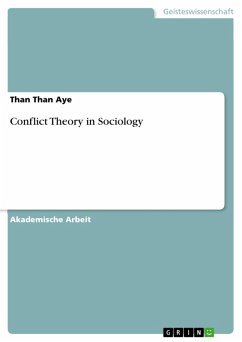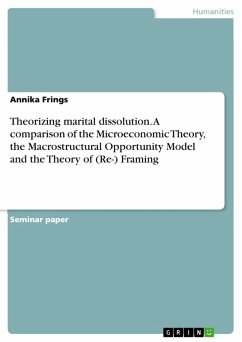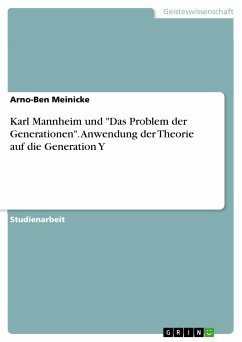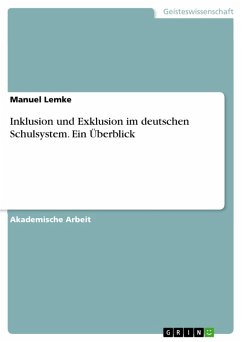
Conflict Theory in Sociology (eBook, PDF)

PAYBACK Punkte
0 °P sammeln!
Akademische Arbeit aus dem Jahr 2012 im Fachbereich Soziologie - Allgemeines und Grundlagen, , Sprache: Deutsch, Abstract: This paper examines different aspects of sociology and education, conflict theory and stratification. In the broadest perspective, education refers to all efforts to impart knowledge and shape values; hence, it has essentially the same meaning as socialization. However, when sociologists speak of education, they generally use a more specific meaning: the deliberate process, outside the family, by which societies transmit knowledge, values, and norms to prepare young people...
Akademische Arbeit aus dem Jahr 2012 im Fachbereich Soziologie - Allgemeines und Grundlagen, , Sprache: Deutsch, Abstract: This paper examines different aspects of sociology and education, conflict theory and stratification. In the broadest perspective, education refers to all efforts to impart knowledge and shape values; hence, it has essentially the same meaning as socialization. However, when sociologists speak of education, they generally use a more specific meaning: the deliberate process, outside the family, by which societies transmit knowledge, values, and norms to prepare young people for adult roles (and, to a lesser extent, prepare adults for new roles). This process acquires institutional status when these activities make instruction the central defining purpose, are differentiated from other social realms, and involve defined roles of teacher and learner. Schools exemplify this type of institutionalization. The central insight of the sociology of education is that schools are socially embedded institutions that are crucially shaped by their social environment and crucially shape it. The field encompasses both micro- and macro-sociological concerns in diverse subfields such as stratification, economic development, socialization and the family, organizations, culture, and the sociology of knowledge. To understand modern society, it is essential to understand the role of education. Not only is education a primary agent of socialization and allocation, modern societies have developed formidable ideologies that suggest that education should have this defining impact.
Dieser Download kann aus rechtlichen Gründen nur mit Rechnungsadresse in A, B, BG, CY, CZ, D, DK, EW, E, FIN, F, GR, HR, H, IRL, I, LT, L, LR, M, NL, PL, P, R, S, SLO, SK ausgeliefert werden.













